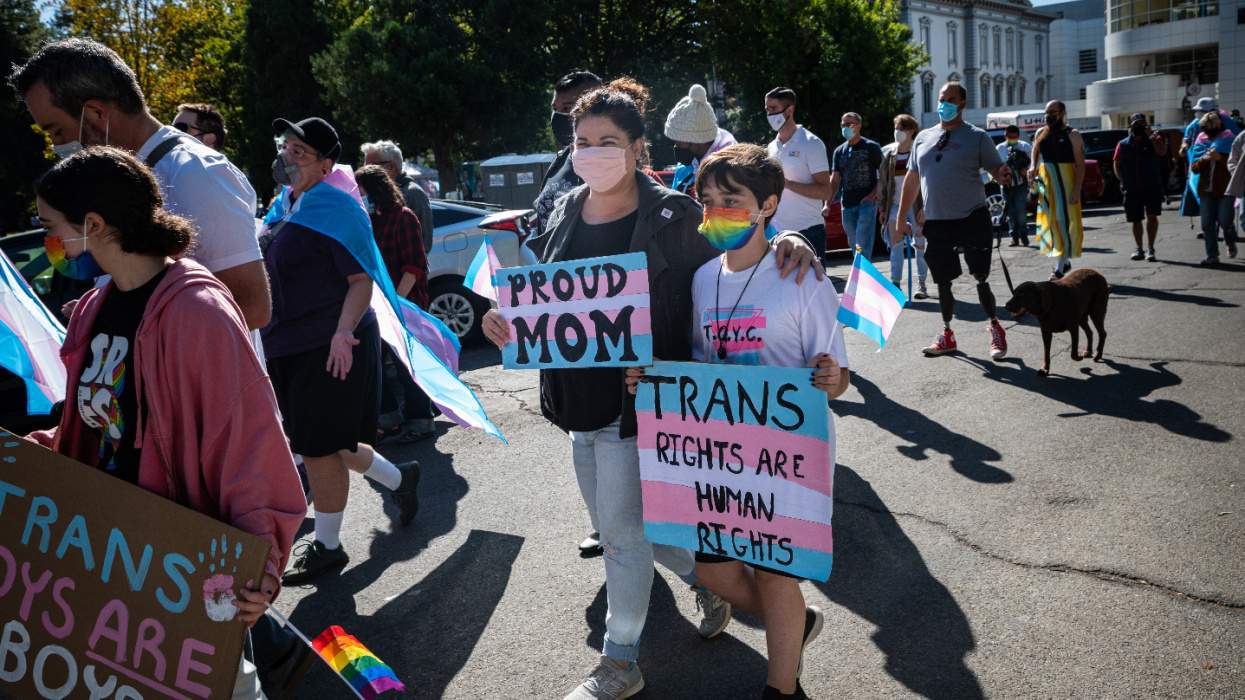The death of nonbinary high school student Nex Benedict is shining a light on Oklahoma’s restrictive restroom law, which opponents have called “unnecessarily cruel for the sake of cruelty.”
Benedict, a 16-year-old sophomore at Owasso High School in Oklahoma, was beaten by fellow students in a school restroom February 7. The school did not call an ambulance for Benedict, who was said to have suffered head trauma, but their grandmother took the teen to a hospital. Benedict died the next day, and the cause of their death is still under investigation. Police have said Benedict did not die from trauma.
Benedict had been subjected to extensive bullying at school, which their grandmother said had intensified due to the bathroom law.
The law, which took effect immediately after it was signed by Republican Gov. Kevin Stitt in May 2022, requires students in public schools and public charter schools to use the restrooms and changing rooms designated for the gender on their original birth certificate. It applies to students from pre-kindergarten through 12th grade. Anyone who does not wish to comply has to use a single-occupancy restroom or changing room. The penalty for schools and districts that violate the law is a 5 percent reduction in state funding.
The legislation came partly in response to a transgender-inclusive restroom policy adopted by schools in Stillwater, Okla. Ryan Walters, then Oklahoma secretary of education and now state superintendent of schools, strongly criticized the policy, calling it part of a “woke agenda” and saying it would make “our young girls uncomfortable and afraid” to use school restrooms, even though no negative incidents had been reported.
After Stitt signed the legislation, civil rights groups quickly condemned it. Nicole McAfee, executive director of Freedom Oklahoma, called it unconstitutional, a violation of federal law against sex discrimination, and “unnecessarily cruel for the sake of cruelty.”
Three trans students and their families sued to challenge the law, contending it violates the Equal Protection Clause of the Fourteenth Amendment to the U.S. Constitution and Title IX of the Education Amendments of 1972 by discriminating on the basis of sex, gender identity, and transgender status. They are represented by Lambda Legal, the American Civil Liberties Union and its Oklahoma affiliate, and the law firm of Covington & Burling.
In January, the U.S. District Court for the Western District of Oklahoma denied their request for a preliminary injunction that would block the law’s enforcement while the suit proceeds and granted the state’s request to dismiss the suit, with the judge saying Title IX applies only to biological sex, that is, the sex assigned at birth. The plaintiffs are appealing.
After Benedict’s death, the ACLU and Lambda issued this joint statement: “We are gravely heartbroken to learn about the death of Nex Benedict and extend our overwhelming condolences to their family, their friends, and the entire transgender community across Oklahoma. The assault on Nex is an inevitable result of the hateful rhetoric and discriminatory legislation targeting Oklahoma trans youth. We challenged Oklahoma’s law requiring schools to discriminate against students like Nex because we believe every student should have the safe and affirming environment they need to thrive, and policies that put transgender students in danger make schools less safe places for all students.
“We are deeply troubled by reports the school failed to respond appropriately to the altercation that preceded Nex’s death and demand a thorough, open investigation into the matter. We will never stop fighting for 2SLGBTQ+ people across Oklahoma and the country until every state is a safe place to raise every family.”
Trans and gender-expansive young people face alarming rates of violence in schools, according to the 2023 LGBTQ+ Youth Report from the Human Rights Campaign and the University of Connecticut. Based on a 2022 survey of nearly 13,000 LGBTQ+ youth ages 13-18 nationwide, it found that 53.9 percent of trans and gender-expansive youth feel unsafe in at least one school setting, with a third reporting they specifically felt unsafe in school restrooms and half saying they felt unsafe in school locker rooms. Two-thirds of trans and gender-expansive youth had been teased or bullied at school at least once in the prior year and a fifth had been hit, pushed, or experienced other forms of physical violence at school in just the 30 days prior to the survey. Yet schools largely failed to respond.
The study also found that “trans and gender-expansive youth who were able to use the bathroom that matches their gender identity more frequently were less likely to screen positive for depression or anxiety, feel unsafe at school, or experience school-based bullying and violence,” an HRC press release notes.
“All students, including trans and gender-expansive students like Nex, have the right to feel safe and protected while attending school,” Tori Cooper, director of community engagement for HRC’s Transgender Justice Initiative, said in the release. “That Nex was only 16 years old compounds this tragic injustice, and they should have lived to see a fulfilling and authentic life. We continue to see a horrifying amount of violence against our community, and our community’s youth seem to be bearing the brunt of it all. Extremist anti-LGBTQ+ hate accounts, like online troll Chaya Raichick, the woman behind ‘Libs of TikTok,’ who was recently appointed to Oklahoma’s library advisory board, are perpetuating a vile and hateful narrative that is permitting these types of public attacks. Their hateful speech is having a direct, negative impact on the lives of trans and gender-expansive folks, including young students like Nex.”
In addition to the restroom law, Oklahoma has several other anti-LGBTQ+ and specifically anti-trans laws and policies. A ban on gender-affirming care for trans youth went into effect at the end of 2023, and health care professionals who violate it can be charged with a felony. In 2022, Stitt, then up for reelection, signed bills into law barring trans girls and women from competing on female sports teams in both public schools and private schools that compete against them and prohibiting nonbinary gender markers on birth certificates. Last year, Stitt, who had won reelection, signed an executive order requiring state agencies to use definitions of men and women according to the gender they were assigned at birth.
Americans United for Separation of Church and State President and CEO Rachel Laser has also spoken out on Benedict's death and the anti-LGBTQ+ atmosphere in Oklahoma. “While the details about the tragic death of Nex Benedict are still being sorted out, one thing is clear: Oklahoma officials failed this teenager," Laser said in a statement. "Backed by Gov. Kevin Stitt, Superintendent of Public Instruction Ryan Walters has launched a crusade to force fundamentalist Christianity into the public schools, with a cruel focus on trans youth. Oklahoma legislators have compounded the harm by passing laws undermining LGBTQ+ rights.
“Oklahoma approved the nation’s first religious public school, which will discriminate against LGBTQ+ students, and Walters appointed Chaya Raichik of Libs of TikTok, unqualified internet bully, to ban books and oversee school safety. The hostile, Christian Nationalist environment Walters and Stitt have nurtured in Oklahoma public schools has created a permission structure for anti-LGBTQ+ persecution, and it’s no surprise that teens noticed. State officials have sent the message that trans/nonbinary kids have something wrong with them and do not have equal rights — creating an atmosphere that empowers bullies, in this case with tragic results."
Pictured: Kevin Stitt















Charlie Kirk DID say stoning gay people was the 'perfect law' — and these other heinous quotes
These are some of his worst comments about LGBTQ+ people made by Charlie Kirk.